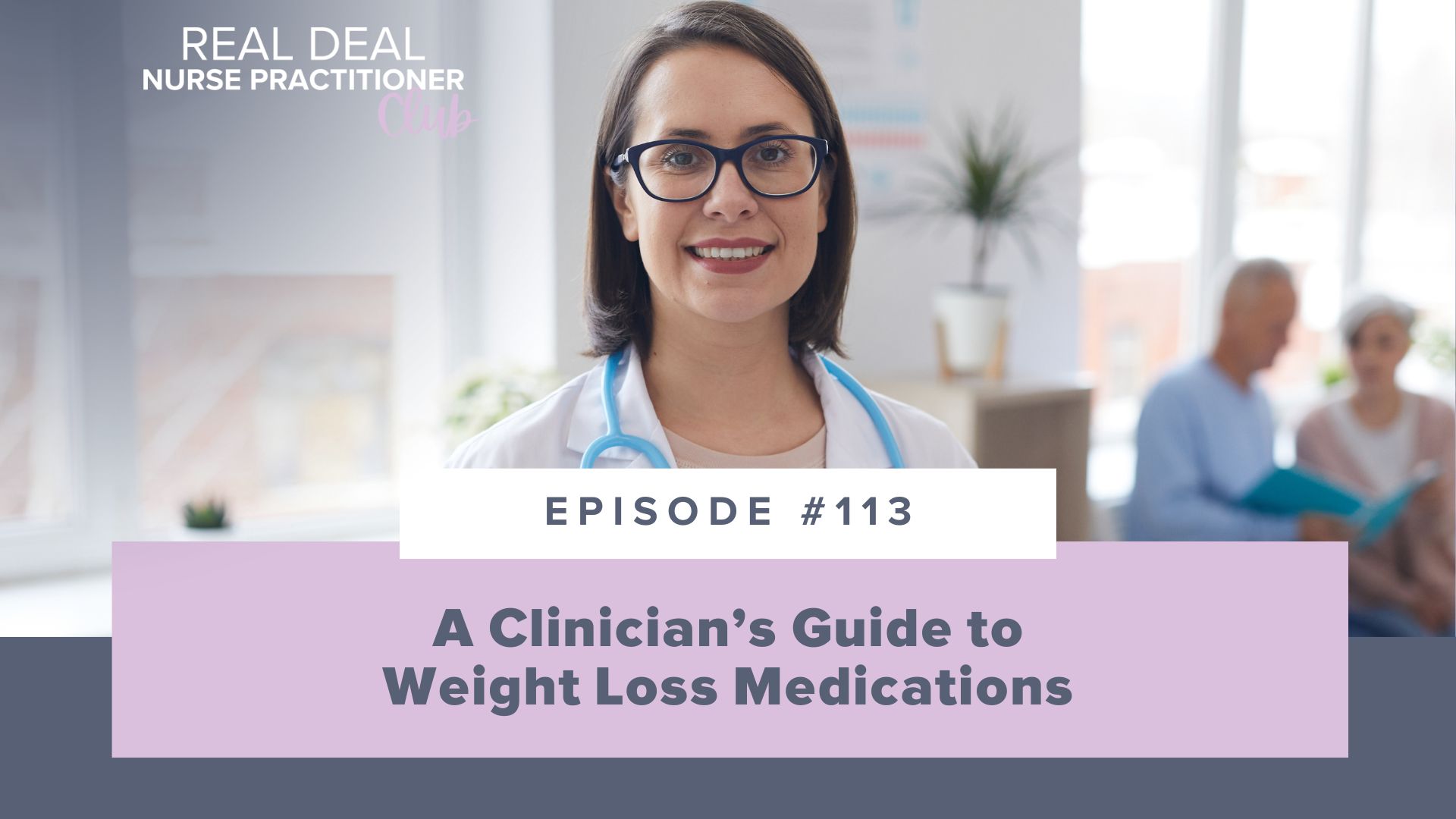Episode #113: A Clinician’s Guide to Weight Loss Medications
- by Sarah Michelle
- May 15, 2024
- Podcasts

This week, Anna and I are here to touch on a hot topic we’ve all heard about: weight loss medications. Drugs like semaglutide and tirzepatide can be very effective for chronic weight management and they’re in high demand right now. So what do you need to know as a responsible clinician?
Over the past couple of years, weight loss medications like Ozempic have skyrocketed in popularity, having gained the attention of celebrities and social media influencers for their seemingly magical weight loss powers. As a real-deal Nurse Practitioner, you must understand how these medications work in the body and how to safely prescribe them, and Anna and I are here to share everything you need to know.
Tune in this week to learn what GLP-1 agonists do, the benefits of medications like semaglutide and tirzepatide, and the side effects you must educate your patients on. We’re exploring some of the predicaments that come from its high demand and popularity right now, and how to be a safe prescriber in practice and stay up-to-date with changing guidelines.
What You Will Discover:
- What GLP-1 agonists do.
- The predicament we’re facing now with weight loss medications.
- Some of the benefits of medications like semaglutide and tirzepatide for weight loss.
- What weight-related comorbid conditions include.
- The most common side effects of semaglutide and tirzepatide.
- How these medications are administered.
- The considerations you must keep in mind before prescribing these medications.
Featured on the Show
Full Episode Transcript:

Welcome to the Real Deal NP Club. Whether you’re hoping to become a real deal nurse practitioner or you already are one, this is the place for you to get the resources you need as you tackle this massive transition into practice. We’re your hosts, Sarah Michelle, Chief Nursing Officer of Blueprint Test Prep, and Anna Miller, Director of Nursing Content. And we’re here to hang out with you each week like your best friends in the NP space. Let’s dive in.
Sarah: Hey everyone, we have got a hot topic for you today, and we are going to talk all about those weight loss medications you’ve been hearing about. I see it in our Real Deal NP group all the time. Semaglutide and Tirzepatide.
Over the past couple of years, these medications have gotten a lot of attention from celebrities, social media influencers, for their seemingly magical weight loss powers. But, as real deal nurse practitioners, we definitely need to know how these medications are working in the body and how to safely prescribe them, because our patients will be asking about them.
Now, as a quick little disclaimer here, please remember, and please hear this, that nothing we say should override your clinical judgment, and the literature is literally always changing. It is your personal responsibility to be a safe prescriber in practice, and to stay up to date with changing guidelines. And today, we are just simply going over the available information we have as of this moment, and we are not providing any type of clinical advice.
And Anna is of course with me today to help go over the important things to remember with these medications.
Anna: Yes, hello, hello. And I’m super excited about this topic today because these medications have become extremely popular. And like Sarah said, you are going to see patients that are asking about these, asking to have them prescribed, or something I’ve kind of seen recently is maybe they are ordering them off the internet from online pharmacy services. Y’all, there are all sorts of back doors to get these out there right now.
And although these medications are effective for weight loss, we need to ask ourselves, how do they actually work? Who should and shouldn’t take these medications? And what side effects do we need to educate our patients on?
Sarah: Yeah, these are all great questions. And luckily, we have got all the answers to these questions. So let’s just start off with a little pharmacology review here.
First, is that these Glucagon-like peptide 1 agonists, you’ll hear them commonly referred to as the GLP-1, I always think of GLP like good little peptide. And this includes semaglutide, which comes in a few different forms. There are injectable forms with current brand names of Ozempic and Wegovy, and a tablet form now that’s a new introduction known as Rybelsus. The Wegovy injectable comes as a higher concentration and dose for weight loss management.
Now, Anna, as a brief refresh from our review courses, what do those GLP-1 agonists do?
Anna: Well, these medications, they do a few things actually. This class is most commonly associated with management of type two diabetes, so they allow for that increased insulin secretion in response to elevated glucose levels. They also lower glucagon secretion, they slow down gastric emptying, and they work in the brain to decrease appetite. So you can see how these medications not only help to improve glucose control, but how they would also promote weight loss.
Sarah: And you may have heard of another medication in this class called Tirzepatide, also known as Mounjaro. Tirzepatide is related to Semaglutide, but in addition to being a GLP-1 agonist, it is also a GIP as well. This means that it does all the things that a GLP-1 agonist medication does, but in a more profound way by dually affecting the GIP and those GLP-1 receptors.
Anna: Yes, exactly. And now that we know a little bit about how these medications work, you can probably see why they’re pretty popular. But I want to walk through a little bit of the history.
Ozempic was FDA approved in 2017 for management of type two diabetes. And since that release, its weight loss side effects have been very, very well known. Then you throw in some TikTok influencers, some celebrities, and that is really how these medications have just skyrocketed in popularity.
Sarah: Yeah, I cannot tell you how many podcasts I’ve listened to where people are talking about these medications. And all different types of podcasts, it’s not just like weight loss podcasts, because I don’t listen to weight loss podcasts. But even on a business podcast I listen to, they were talking about taking these medications.
Alongside that, in 2021 Wegovy, the higher dose semaglutide, was specifically FDA approved for weight management. And then soon after, in 2022, Tirzepatide was approved for diabetes management under that trade name of Mounjaro. And then at the end of 2023 it was approved for weight management under the trade name of Zepbound.
Anna: Yeah, and we keep saying these are getting approved, they’re becoming so popular, they’re becoming so widely known, but the predicament that we are in now is that there’s a shortage of these drugs. Manufacturers did not anticipate such popularity and demand, and now patients who have diabetes and obesity who need these medications to manage these conditions are struggling to get them.
Sarah: Which really, honestly, just puts a lot of clinicians in a tough spot. We need to keep up to date on the availability of these medications and different or alternative options while trying to provide our patients with the care they need.
And so let’s go over a little more in depth, what are the benefits of medications like semaglutide when used for weight loss, since it is so popular right now? Semaglutide at higher doses, under that name of Wegovy, have been shown to contribute to statistically significant weight loss, which has been defined as at least a 5% reduction in weight.
Anna: Yeah, and I think we’re all familiar at this point with the benefits of weight loss in individuals with elevated BMIs. Patients are able to reduce their risk for diabetes and diabetes-related complications. Weight loss helps reduce stress on joints and improve musculoskeletal health. It leads to increased energy levels, and not to mention a reduced risk for sleep apnea, which can also lead to so many things. And that’s really just to name a few here.
Anna: Yes, and as if those benefits weren’t enough, and we talk about this in the courses, Wegovy has been shown to be cardioprotective. And what do we mean by that? Well, along with the weight loss and the better glycemic control, patients may experience improved blood pressure and cholesterol levels, which reduce their risk of heart disease.
And so, Anna, what do we need to know about indications for these weight loss medications?
Anna: Well, we’ve talked already about how they’re used for weight management, but there are some current parameters. So, both Wegovy and Zepbound are indicated for weight management in adults with a BMI greater than or equal to 30, and remember that is considered in that obesity range, or with a BMI greater than or equal to 27, so that overweight range, who also have at least one weight-related comorbid condition.
Sarah: Can you kind of expand on what that means for someone who might not know?
Anna: Yeah, obesity, it’s associated with so many conditions. So, weight-related comorbid conditions include things like hypertension, type 2 diabetes, elevated cholesterol, for example.
Sarah: Absolutely. And then the newest indication for Wegovy is that it’s approved for weight management in children 12 years of age and older whose BMI is greater than or equal to the 95th percentile for age and gender. And this really has the opportunity to be a game changer for combating childhood obesity. And so, definitely stay tuned for more research about long-term use, you know, safety in those adolescents.
And then another big thing we have to talk about here, Anna, what about those side effects?
Anna: Yes, definitely, always, always, always need to remember that as great as these sound, there are side effects. And the most common side effects of Wegovy and Zepbound are GI-related. So, this might mean nausea, vomiting, diarrhea, even abdominal pain or cramping. I’ve heard people report heartburn, bloating, but the good news is that these side effects tend to subside over time.
Sarah: Yes, and I know from just real-world experience that oftentimes these GI side effects are exacerbated by those who don’t get enough protein in their diets, which I feel like as a whole most of us don’t have enough protein in our diets. And the protein, like the goal protein amounts are way more than people would anticipate. So just put that in your back pocket for something to be thinking about.
And then how about how are these medications administered?
Anna: Yeah, so Wegovy and Zepbound, they are both once-weekly injections. And so, of course, again, talking side effects, injection site reactions and of course tenderness may also happen.
Sarah: Some other considerations before we prescribe these are knowing what we need to monitor for. So now, semaglutide and Tirzepatide both have a box warning for that risk of thyroid c-cell tumors, and that means that we should not be prescribing these medications in patients with a personal or family history of medullary thyroid cancer or multiple endocrine neoplasia.
Also, the FDA is currently reviewing reports of suicidal thoughts and actions in patients who are taking these GLP-1 agonists, although at this moment, there is no conclusive evidence linking the two.
Anna, anything else we should monitor for or know about?
Anna: Yeah, well, besides just obviously keep monitoring the research that is coming out, they are looking into these so much more as they are increasing in terms of popularity. But in terms of monitoring, based on how these medications work and what they do, we, of course, should be monitoring, you know, weight, blood pressure, and glucose, or even more specific diabetes labs like an A1C. And checking renal function prior to starting therapy is also a good idea.
Sarah: You know, we talked a little bit about those GI side effects, so if these are severe, of course, always keep your critical thinking hat on and be looking at things like dehydration and pancreatic function on top of renal function as they go too.
And then lastly here, these medications are not indicated for use during pregnancy. Although a healthy weight and glucose control are associated with positive pregnancy outcomes, alternative medications are indicated for diabetes management during pregnancy. And ACOG, or the American College of Obstetricians and Gynecologists, specifically advises against weight loss medications during pregnancy in particular.
For our last thing here before we end this episode, remember that a part of our job as NPs is education, and so Anna, what kind of education should we be doing?
Anna: Yeah, a really, really big thing that we should emphasize is the need for patients to also work on lifestyle modifications during this time, right? Work on healthy eating habits, or exercise, or whatever it is that will be incorporated into their daily life, and not just rely on medications to lose weight, right?
There are a lot of reports lately about patients regaining most or all of the weight loss after stopping these medications, and I know that can just be so, so disappointing for patients to regain that weight. So we want to be checking in with them, making sure they’re meeting their goals, counseling on healthy habits, managing underlying conditions.
Sarah: Yeah. Also know, back to that protein-related comment, that with these medications, if you’re not working out and trying to build muscle, what they will do is you will lose weight because you are losing muscle, not because you are losing fat, which also makes your protein intake very important, but these lifestyle interventions as well. Everything really goes hand in hand. This should be a tool for your weight loss, this should not be your entire weight loss plan.
Anna: Yes.
Sarah: Absolutely it’s a tool in your toolbox, but it is not the be-all, end-all solution to losing weight. And I think this, too, is a good segue into how long the evidence recommends prescribing these medications. You know, people are thinking, should I be on them for a year, two years, a couple of months? And there’s really no limit on how long patients can take these.
If using them for diabetes management, patients could take them for many years. But for weight management, it really depends on the patient and how much weight they’re looking to lose. And so as clinicians, we need to monitor for side effects and help them on their journey to a healthy weight. And then once they reach that goal weight, we need to make sure they have the healthy habits in place so they can maintain that weight loss.
Anna: Yes, those healthy habits, they are so, so important. But another patient education point, remember these are injectable medications, is that we need to make sure that they know how to inject these medications safely.
Specifically, Wegovy and Zepbound, they are subcutaneous injections in the abdomen, thigh, or upper arm. They can be administered at any time of day without regard to meals, and they are given on the same day each week. And of course, we have had this ingrained in us as nurses, but with any routine injections, patients should be advised to rotate injection sites. In patients that are hesitant about giving themselves an injection, you can educate a family member or a friend, whoever really will be helping them administer that medication.
Sarah: Also too, as mindful, cost-conscious nurse practitioners, we need to educate our patients on the potential costs of these medications. Unfortunately, not all insurances will cover these for weight management. In patients with other comorbid conditions like diabetes or hypertension, insurance coverage is obviously going to be more likely.
And with the supply shortage of semaglutide and Tirzepatide, out-of-pocket costs are even higher. You should encourage your patient to check with their insurance carriers so they can understand any potential out-of-pocket costs up front too.
Anna: Yes, yes, absolutely. And one last point I do want to make here is really just be aware of generic drug names here. Because of this shortage, a lot of compounding pharmacies, medical spas, weight loss clinics, they’re advertising these generic forms. But the problem here, and again keep your eye on the research, but there are no generics available. All of these medications are still under patent, but compounding pharmacies, they’re able to get a hold of the active ingredient, semaglutide for example, and then combine it with other ingredients to make an injectable form.
But the issue here is that the compounding process and products are not FDA monitored or regulated. And I am not saying here that compounding pharmacies are bad by any means, right? They absolutely help a lot of patients. But we should all, patients included, be encouraged to just do thorough research on where their medications are coming from, especially if they are buying them privately online.
Sarah: Absolutely, an excellent, excellent point there. These medications may seem like miracle drugs to patients who’ve struggled with their weight, but always, always, always patient safety comes first.
So, all right, y’all, I know we talked about a lot today. These drugs can be really effective for chronic weight management and are in very high demand right now. And as clinicians, we need to consider their labeled FDA approved indications, as well as side effects, and never forget to do our own research into the most up-to-date evidence.
Anna: And just remember, due to this really high demand and popularity, cost may be high, patients may be seeking alternatives. And just make sure to review side effects and other risks with them prior to prescribing. And just as importantly, if not more, support them on this weight loss journey by encouraging all those lifestyle modifications, those healthy habits like eating and exercise.
Sarah: Yes, all very, very important things. And thank you everyone for tuning in this week. We hope you enjoyed this topic. We hope to do more clinical-based topics in the future, and we’ll be talking to you soon.
As an extra bonus friends, if you’re looking for support no matter what phase of your nurse practitioner journey that you’re currently in, I have communities available for both students and new nurse practitioners. In these communities, we work to uplift one another and grow this profession together every single day. Links to join will be included for you in the show notes.
Thanks for listening to the Real Deal Nurse Practitioner Club. If you want more information about the different types of support that we offer to students and new nurse practitioners, you can visit npreviews, with an S, dot com. We’ll see you next week.
Enjoy the Show?
- Don’t miss an episode: follow the podcast on Spotify, Apple Podcasts or RSS.
Related Posts
Search the Blog
Join our Facebook Group!
Get FREE support and encouragement from thousands of FNP/AGPCNP students and our NP Support team.
Learn More3 Study Hacks to Conquer Your NP Exam!
Download these tips that have helped thousands of students pass their NP board exams.
Download NowInstitutional Partnerships
Are you a faculty member and would like to bring Sarah Michelle’s resources to your school? Email us at nursinggroups@blueprintprep.com for special institutional pricing or click on the link below to learn more.
Learn MoreGroup Discounts
Are you a student and have 10 or more classmates interested in purchasing Sarah Michelle’s courses? Email us at nursinggroups@blueprintprep.com for special pricing.



